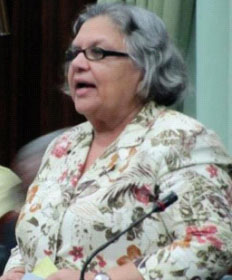The Ministry of Finance has advised the Guyana Elections Commission (GECOM) that it must return to the National Assembly for permission to alter its budgetary allocations in order to finance the holding of general and regional elections.
“I understand that some law passed in 2015 which seems to suggest that a constitutional agency cannot alter its allocations without approval from the National Assembly,” PPP/C-nominated commissioner Bibi Shadick told Stabroek News in an invited comment.
The law in question is the Fiscal Management and Accountability (Amendment) Act, No. 4 of 2015. Specifically Section 80B (7) states that the annual budget of a constitutional agency approved by the National Assembly shall not be altered without the prior approval of the National Assembly.
It is one of four amendments to the principal act that was passed in August, 2015. At the time of its passage, Minister of Finance Winston Jordan argued that it would secure the financial autonomy of constitutional bodies, including GECOM, by allowing them to receive lump sum allocations in the budgeting process. He, however, emphasised that the financial autonomy given to the agencies would not exclude them from having to meet accounting and auditing standards.
“The removal of all vestiges of interference by the Executive into the affairs of the constitutional agencies will boost the public’s confidence in the operations and decisions of these bodies,” Jordan had told the House in the absence of the opposition, whose members were yet to take up their seats.
The Finance Secretary has since reminded GECOM that in keeping with these provisions the ministry has “no locus standi to tell GECOM to amend its allocation.”
Shadick has argued that her reading of the provisions suggests that section 80B (7) is in conflict with other provisions in the same Act which suggests these allocations are in the nature of a subvention.
“Any agency which gets a subvention can spend based on their own prioritising as they draw directly from the Consolidated Fund. This provision puts a crimp in agencies’ ability to manage funds as someone else controls it, which is the National Assembly,” she noted.
At its statutory meeting last week, the commission directed Chief Election Officer (CEO) Keith Lowenfield to ask the Ministry of Finance whether the $3 billion allocated for House-to-House registration in 2019 can be used to fund elections this year.
The advice of experts in the area was sought as a means to end a deadlock between the government and opposition-nominated commissioners. The opposition-nominated commissioners argue that the money can be used via virement, while government-nominated commissioner Vincent Alexander has indicated that his reading of the law suggests that only 10% of any allocation can be vired. He maintained that the opinion and advice of experts in the area are required to decide on the way forward.
Today’s statutory meeting, which begins at 9.30 am, will discuss the ministry’s advice and possibly decide on a way forward.
Government-nominated Commissioner Desmond Trotman has indicated that the agenda will include continued discussion “on the kind of elections we would like to have and hopefully some agreement on the way forward.”
Shadick is not so hopeful, telling this newspaper that she doesn’t “see anything of import happening at GECOM.”
“I hope I’m wrong because we need something to happen but I don’t see anything happening…I really don’t know at this point. The whole government machinery seems to be working to stall elections. We need something. It’s a mess and I’m sorry for this country. It’s a mess. In the worst of the PNC dictatorship I have never been this apprehensive of where our country is going and there are people who are willing to let it descend into an unconstitutional wasteland,” Shadick lamented.
Last week Alexander noted that the decision on an election will have to return to the legislature for an expansion of the timeframe, which is provided for by Article 106(7) of the Constitution.
The CEO has indicated that the Secretariat would need 148 days to run off elections. He added that with the life of the current voters’ list coming to an end on April 30th, the 148 includes 28 days for a process of claims and objections. This timeline rules out the March 21st deadline set by December 21st no-confidence vote against the government as well as the holding of house-to-house registration, which has been projected to last nine months.
Alexander stressed last week that both propositions require more time.
“There are two propositions coming from the secretariat: July with Claims and objections and February with House to House. Both go beyond the March 21st deadline, so the matter either way has to return to parliament,” Alexander maintained.
Articles 106(6) and 106(7) of the Constitution prescribe that the Cabinet, including the President, shall resign if the government is defeated by the vote of a majority of all the elected members of the National Assembly on a vote of confidence and elections are to be held within three months unless a two-thirds majority of the House grants an extension.
Therefore, a July date for elections would require the approval of at least 43 members of the 65-member house.
Minister of State Joseph Harmon has, however, indicated that at this stage, given that the “issue is still in the court,” it would be premature to have a sitting about timelines and an elections date. “Once there is government business to be discussed in the National Assembly, the National Assembly will be called. Once there is government business to be transacted in the National Assembly, then the National Assembly will meet,” he said.










